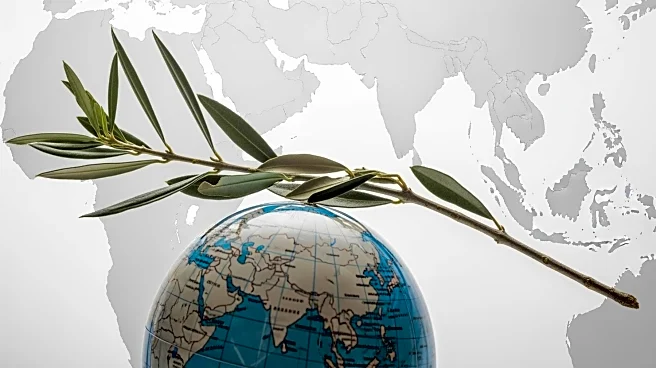What's Happening?
Pakistan is facing increased tensions with Afghanistan due to a surge in cross-border attacks by the Tehrik-e-Taliban Pakistan (TTP), which operates from Afghan territory. Despite Pakistan's historical
support for Afghanistan, including keeping its embassy open during the Taliban's takeover in 2021 and advocating for the release of Afghanistan's frozen assets, the relationship has soured. Pakistan has made numerous diplomatic efforts to address the issue, including sending religious leaders and officials to negotiate peace and offering economic incentives. However, the Afghan government has not taken action against TTP camps, leading to a significant increase in militant infiltration into Pakistan.
Why It's Important?
The situation is critical as it affects regional stability and security. Pakistan's patience is wearing thin, and continued inaction by Afghanistan could lead to a more aggressive response from Islamabad. This tension not only impacts bilateral relations but also has broader implications for regional security, potentially affecting international efforts to stabilize Afghanistan. The presence of modern weaponry left by the U.S. and NATO in the hands of militants further complicates the situation, posing a threat to both countries' security.
What's Next?
Pakistan remains open to cooperation but warns that its patience has limits. If Afghanistan continues to allow its territory to be used for attacks against Pakistan, Islamabad may respond more forcefully. The Afghan government faces a choice: take credible action against militant groups or risk further deterioration of relations with Pakistan. The outcome will significantly impact the security and economic stability of both nations.
Beyond the Headlines
The ongoing conflict highlights the complex dynamics of regional politics and the challenges of maintaining peace in a volatile area. Pakistan's long-standing support for Afghanistan, including hosting millions of refugees and facilitating trade, underscores the depth of the current crisis. The situation also raises questions about the effectiveness of international diplomatic efforts and the role of external powers in regional conflicts.








